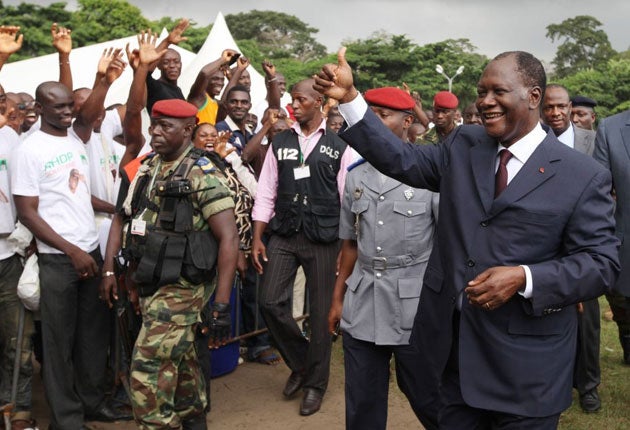Ivory Coast teeters on the brink, UN warns
Militias threaten to attack hotel refuge of poll victor Ouattara

The spectre of civil war loomed over the Ivory Coast last night, amid growing fears that a notorious youth militia loyal to former president Laurent Gbagbo might attempt today to storm the hotel where his rival, Alassane Ouattara, has taken refuge.
Sectarian violence has spilled on to the streets of Abidjan following last month's presidential election, in which Mr Gbagbo refused to cede power despite international condemnation and global recognition that he had lost the vote.
Mr Ouattara and his government-in-waiting have taken shelter in the city's Golf Hotel, a luxury compound protected by United Nations troops who are themselves blockaded by thousands of Mr Gbagbo's supporters.
After a relative lull in sectarian violence, which has already killed more than 170 people, tensions have once again reached boiling point following a threat from a militia leader, Charles Blé Goudé, to the effect that Mr Ouattara's supporters have until New Year's Day to "pack up their bags".
The UN said yesterday that its secretary general, Ban Ki-moon, was "deeply alarmed" by the threats and had warned that any attempt to take the hotel could reignite a civil war which tore the country in half seven years ago and destabilised what was once a West African economic success story.
Mr Ban's spokesman, MartinNesirky, said that the UN secretary general called on Mr Gbagbo's supporters to "refrain from such dangerous irresponsible action" and insisted that the 800 troops guarding the hotel would defend themselves if attacked.
At a news conference yesterday, Guillaume Soro, who was appointed Prime Minister by Mr Ouattara, said that more than 200 people had been killed and 1,000 wounded in violence over the disputed vote. He added that Ivory Coast is "indeed in a civil war situation".
As head of the Young Patriots, a youth militia that is staunchly loyal to Mr Gbagbo and deeply hostile towards foreigners, Mr Blé Goudé is regarded as a major power player within Ivorian politics. Fluent in English, he briefly studied at Manchester University before returning to set up his youth militia during the 2002-2003 civil war.
He forged himself a reputation as a tough "street general" and used his militia to run violent anti-French and anti-UN gangs that terrorised the foreign population in the Ivory Coast between 2004 and 2005.
Amid growing concerns that nationalist rhetoric emanating from the Gbagbo camp might restart the xenophobic violence of that period, France'sforeign ministry yesterday reiterated a call for its citizens to leave the Ivory Coast.
"Although foreigners have not so far been directly threatened, the French authorities renew their advisory to defer plans for trips to Ivory Coast, and to all the French who can ... to temporarily leave Ivory Coast until the situation normalises," the ministry said. There are thought to be around 14,000 French citizens in the country, half of whom have duel nationality.
Despite his global pariah status, Mr Gbagbo has refused repeated calls to step down and remains in firm control of the military. Human rights groups have accused his supporters of organising death squads to abduct supporters of Mr Ouattara. The UN believes up to 80 bodies may be inside a building nestled among shacks in a pro-Gbagbo neighbourhood on the outskirts of Abidjan, and there are reports of a further mass grave in the interior of the country. Attempts to reach the site in Abidjan have been blocked by heavily armed men.
The ongoing stand-off has highlighted the international community's inability to persuade or force Mr Gbagbo to step down.
Regional leaders from Ecowas, the Economic Community of West African States, have threatened military action after this week's visit by a high-level delegation failed to persuade Mr Gbagbo to step aside.
The delegation is set to return on Monday, to continue pursuing a diplomatic solution, but Ecowas defence chiefs met yesterday to begin drawing up plans for a military intervention if the talks fail.
Ecowas has a rapid reaction force of between 2,000 and 3,000 men already stationed in Sierra Leone and Mali, but experts have questioned whether such an invasion force would be adequate to take on an obstinate opponent who is still in charge of his own military.
Ecowas has deployed troops on several occasions in the last two decades, notably to Sierra Leone and Liberia during those countries' civil wars. However, the Nigerian-dominated forces there proved themselves ill-disciplined: in Liberia, Ecomog, the Ecowas Monitoring Group, was popularly dubbed "Every Car or Movable Object Gone", due to the soldiers' predilection for theft. There are also fears that any military intervention would unleash militias which are already spoiling for a return of the civil war years.
Join our commenting forum
Join thought-provoking conversations, follow other Independent readers and see their replies
Comments
Bookmark popover
Removed from bookmarks